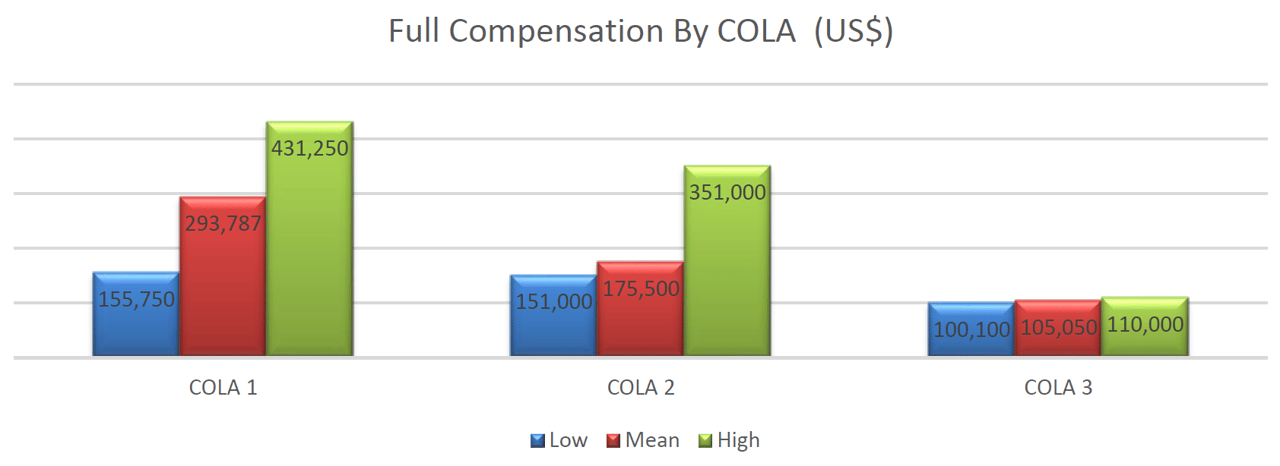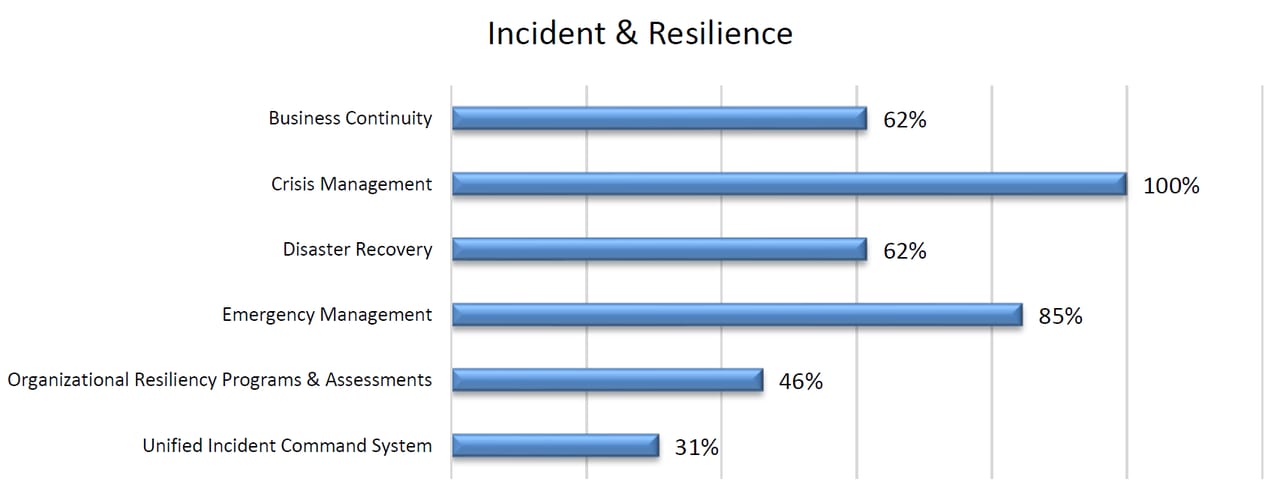january 2022

How Much Do Security Executives Earn?

eternalcreative / iStock / Getty Images Plus via Getty Image
The 2020 Asia-Pacific Compensation Survey benchmarks compensation rates for security executives in the Asia-Pacific region. The survey, which has been produced since 2006, is conducted by the Asia Crisis and Security Group (ACSG) and Security Management Resources (SMR Group) and collected data from 161 Asia-Pacific security leaders. Respondents represented more than 25 industries, including banking and financial services; software, network and telecommunication services; retail; and oil and gas services, among others.
The survey measured responsibilities, demographics and compensation rates by job titles, which included Global or Group Head/Director/Manager (representing the senior-most security position in an organization), Director of Security/Global Functional Head, Regional Director/Head and more specialized roles.
In deciding which roles to include in the survey, ACSG Chairman Mark Hayman said, “We looked to strike a happy medium and reflect the most common APAC security roles (Group Head, Regional Director, Regional Manager, Country Manager) — and to include specialists, such as Analysts, with a view to reflect the needs of the majority.”
The survey measured compensation rates by the cost of living relative to the country in which security leaders worked. Image courtesy of ACSG

According to the survey, the average reported salary for a security leader at the Global or Group Head/Director/Manager level was between U.S. $105,050 and $293,787 in 2020. These compensation rates varied based on the cost of living associated (COLA) with different countries in the Asia-Pacific region.
Security leaders in Global Functional Head and Director of Security roles earn an average guaranteed compensation of $184,336 and a full compensation of $255,618. Regional Directors and Heads reported their compensation rates as averaging between $118,208 and $240,612. Hayman noted that these salaries are representative of a 10% reduction in compensation across the Asia-Pacific region.
ACSG Secretary Simon Watts underlined the importance of the compensation benchmarking survey, saying, “The employer and respective human resource departments and agencies benefit from knowing they are offering a fair salary to attract new talent or retain current employees. Likewise, employees benefit from knowing they are valued by their employer and being rewarded appropriately or are being offered a salary for a new role commensurate with their peers.”
The duties of senior-most security executives vary widely. The survey grouped job responsibilities into eight categories. When it comes to incident and resilience duties, 100% of senior security executives reported handling crisis management. Image courtesy of ACSG

Senior-most security executives reported their job responsibilities broken down into eight categories: administrative, brand/profit protection, cyber, human capital, intelligence, investigations, physical security, and incident and resilience duties. The most common responsibility noted by respondents was crisis management, with 100% of senior security executives listing this as one of their duties. Ninety-two percent of senior security leaders manage physical security programs and a variety of administrative tasks, including policy development and implementation, strategic planning and vendor management.
The survey examined the demographics of security executives in the Asia-Pacific region, including education level and professional experience. Notably, 77% of security executives at the Global Head/Director level had previous government experience.
Looking forward to next year’s survey, Watts noted, “The data used for this year’s survey was collected in late 2020. Although we cannot rule out any relationship between the immediate impact of COVID-19 to the [10% compensation] reduction as noted above, we do know that many ACSG members were, and still are, responsible for much of the ‘heavy lifting’ in their organizations in relation to the COVID-19 pandemic. We would like to structure our next survey to better understand any correlation in the value of security professionals to the business in times of crisis as reflected in their compensation. That would be a useful correlation to substantiate.”
Find more information about the survey on the ACSG and SMR Group websites.
advertisement
6 New Security Executives Announced
Security executives on the move! Which industry leaders have recently begun new roles? Read more about the appointments at SecurityMagazine.com.

Michael Gregg — New Chief Information Security Officer of the State of North Dakota
Michael Gregg has been named the new Chief Information Security Officer (CISO) of North Dakota. Prior to his appointment, he acted as interim CISO and previously held the role of Director of Cyber Operations for the state. Gregg brings more than two decades of experience in information security and risk management to his role. Congratulations! Image courtesy of Gregg
Walter Gunn — New Director of Safety and Security at Tachi Palace Casino Resort
Walter Gunn joins the Tachi Palace Casino Resort as Director of Safety and Security. Gunn has more than a decade of security experience, including at Harlow’s Casino Resort and Spa in Greenville, Mississippi and Rivers Casino in Philadelphia. He has 27 years of experience in security management and law enforcement with expertise in law enforcement training, emergency management and extensive knowledge of security system design and installation. Gunn works closely with local law enforcement in his new role, ensuring more of a presence on the property with on-site patrolling and walk-throughs. Congratulations! Image courtesy of Gunn
Kinamo Lomon — New Director of Operations at Princeton University Department of Public Safety
Kinamo Lomon has been named the Princeton University Department of Public Safety (DPS)’s Director of Operations. As Director of Operations, Lomon will oversee the daily operations for DPS, including patrols, the detective bureau, the communications center, community relations, information technology and cultural property security. He will also lead DPS training, professional development initiatives and recruitment efforts as well as manage the command of campus emergencies and special events. Lomon brings over 20 years of law enforcement experience to the role, having previously served as the Director of Public Safety for the Willingboro Police Department in New Jersey. Congratulations! Image courtesy of Lomon and Denise Applewhite
Marco Maiurano — New CISO at First Citizens Bank
Marco Maiurano joins First Citizens Bank as CISO. He is responsible for overseeing the company’s information security operations, identity and access management, information security architecture and security consulting solutions. Prior to joining First Citizens Bank, Maiurano held the positions of Chief Security Officer for Barclays (Americas) and Global Director of Cyber Intelligence and Incident Response at American International Group (AIG). Maiurano also held critical cybersecurity and third-party risk management roles at Citigroup and The College Board of New York. Congratulations! Image courtesy of Maiurano
Sherry St. Clair — New Chief of Police at West Virginia University
Sherry St. Clair is the new Chief of Police for West Virginia University (WVU). A security leader with 27 years of experience in public safety, St. Clair will prioritize the safety of WVU’s more than 28,000 students. St. Clair is a member of the WVU CARE Team, a cross-functional team that helps at-risk students access the support and assistance they need to succeed at the university. St. Clair also is a member of the WVU Public Safety Advisory Committee, the Monongalia County Sexual Assault Response Team and the WVU Pedestrian Safety Committee, among other groups. Congratulations! Image courtesy of St. Clair and Morgan Goff
Kim Wyman — New Senior Election Security Lead at CISA
Washington Secretary of State Kim Wyman will join the Biden Administration as the Cybersecurity and Infrastructure Security Agency’s Senior Election Security Lead. As an expert on elections and an experienced Secretary of State, Wyman will help ensure the security and resilience of election infrastructure. Prior to being elected as Washington Secretary of State, Wyman served as the Thurston County Elections Director for nearly a decade and served three terms as the elected Thurston County Auditor (2001-2013). Congratulations! Image courtesy of Wyman
january 2022


